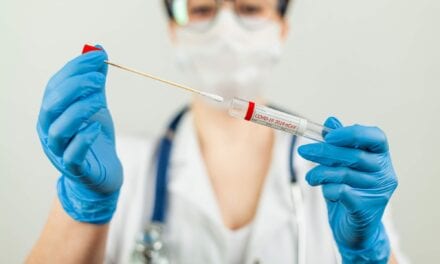Researchers from Duke University Medical School of Singapore have developed a new method for detecting covid-19 neutralizing antibodies in serum that is safer, faster, easier, and more effective than traditional virus-based assays, with comparable specificity.1 The work was done in collaboration with GenScript Biotech, Piscataway, NJ, which is commercializing the technology globally as the cPass test.
The new cPass test is based on an enzyme-linked immunosuppressant assay (ELISA) format, a powerful method of antibody detection that has the potential to be highly scalable and much more suitable for screening large populations compared with traditional live virus neutralization assays. The testing strategy was validated in two covid-19 patient cohorts in Singapore and China (with a sample size of 375 and 250, respectively). The study directly compared the clinical performance between the cell- and virus-based detection test (cVNT) and the surrogate virus neutralization test (sVNT), or cPass, with results showing that the cPass test was able to detect neutralizing antibodies from patients with 95% to 100% sensitivity and 99.93% specificity.
The cPass SARS-CoV-2 Neutralization Antibody Detection Kit is currently under review for emergency use authorization (EUA) with the FDA, is CE marked for use in the European Union, and has received provisional authorization by the Health Sciences Authority (HSA) in Singapore.
Unlike the Conventional Virus Neutralization Test (cVNT), the Surrogate Virus Neutralization test (sVNT) method used in the cPass kit can detect much faster (~1hr) the presence of neutralizing antibodies and does not require the use of live virus and biosafety containment, making it broadly available and much more consistent between different batches and facilities.
“We are very pleased that [Professor Lin-fa Wang’s] work has come to fruition. The work described in this paper not only demonstrates for the first time that sVNT can very quickly detect neutralizing antibodies in hundreds of clinical samples but also provides a key advantage over regular serology kits in its ability to detect these antibodies in an isotype and species-independent manner,” says David Martz, vice president of new product management in the life science group at GenScript.
Available immunoglobulin-based (IgG, IgM or IgA) ELISA tests on the market detect antibodies that bind to virus proteins and cannot distinguish between neutralizing and binding antibodies. In contrast, the cPass test is functionally different and is specifically designed to detect antibodies with neutralization function.
The relationship between antibodies and immunity against covid-19 has been extensively researched and reported. A recent CDC report found that positive serological ELISA results may not correlate well with the virus neutralization assays.2
Wang’s study performed on two covid-19 patient cohorts reported that even though patients exhibited a low level of IgG and IgM antibodies, the sVNT assay still detected a significant level of neutralizing activity. Additionally, results obtained from two SARS serum panels, showed that neutralizing antibodies were detectable 17 years after initial infection, which is extremely promising news for recovered covid-19 patients since these two viruses belong to the same family known as the Betacoronavirus genus.
“It is great news for scientists researching herd immunity and vaccine efficacy, as now they will have access to this innovative research tool to study the presence of neutralizing antibodies in a population. We believe the cPass test will help shed new light on the current plaguing mysteries of covid-19,” adds Martz.
For more information, visit GenScript.
Featured image: Fig. 1: Principle and initial validation of the SARS-CoV-2 sVNT. a, The mechanism of cVNT. Anti-SARS-CoV-2 neutralizing antibodies block the SARS-CoV-2 spike protein from binding to hACE2 receptor proteins on the host cell surface. b, In the sVNT assay, anti-SARS-CoV-2 neutralizing antibodies block HRP-conjugated RBD protein from binding to the hACE2 protein pre-coated on an ELISA plate. The illustrations were created using BioRender. The data presented are the mean of two independent experiments. (courtesy Nature Biotechnology).
References
- Tan, C.W., Chia, W.N., Qin, X. et al.A SARS-CoV-2 surrogate virus neutralization test based on antibody-mediated blockage of ACE2–spike protein–protein interaction. Nat Biotechnol (2020). doi: 1038/s41587-020-0631-z.
- Payne DC, Smith-Jeffcoat SE, Nowak G, et al. SARS-CoV-2 Infections and Serologic Responses from a Sample of U.S. Navy Service Members – USS Theodore Roosevelt, April 2020. MMWR Morb Mortal Wkly Rep. 2020;69(23):714-721. doi: 15585/mmwr.mm6923e4.





